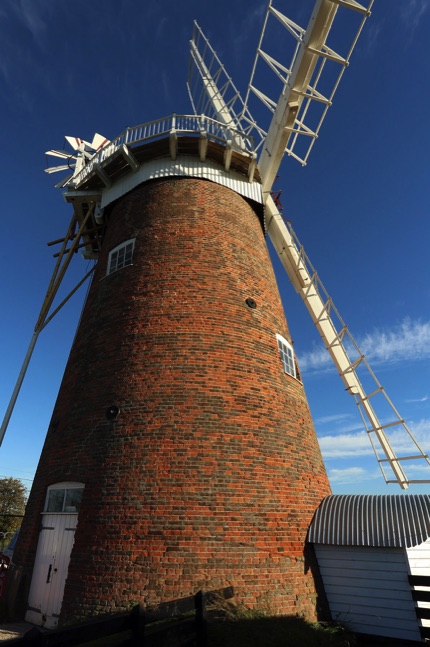Horsey Windpump
FOR many decades Horsey Windpump has been a prominent visual link with the history of the Norfolk Broads.
It has withstood floods, fierce storms, wars and a lightning strike that finally put it out of action in summer 1943. Since being acquired by the National Trust more than 60 years ago it has become a tourist attraction, but even though it had been retired, the years and the weather continued to take their toll.
In 2014 the sails, which had made the pump visible for miles around, were removed because they had become too rotten. Two years later the cap was also removed and the iconic structure was left looking somewhat forlorn. But it was the start of a restoration project costing more than £300,000 that would see it topped once more with a boat-shaped cap and sails.
Horsey
Windpump

The aim was to bring it back into full working order, complete with turning sails.
Built in 1912 by Ludham millwright Daniel England, who invented the patent turbine for draining fens, it was on the site of an older pump that was irreparably damaged nearly 20 years before when the whole of the top was blown off in a gale.
It was one of more than 240 dotted all over the Broads to keep the land drained by pumping water from the ditches - known in Norfolk as dykes - into the tidal waterways.
Historians believe they also had a part to play in the county's smuggling operations. The sails were used by marshmen to signal a warning if the revenue men were searching for contraband landed on the beaches. "Horsey Mill was reputedly used in this way. A message could travel from Yarmouth to Horsey in a quarter of an hour — much faster than a customs man could ride," says the trust.
Many pumps are now little more than stumps in the marsh landscape, although some like the Berney Arms near Great Yarmouth, still have their sails. They have been replaced by modern electric pumping systems.
Horsey worked until July 1943 when it was struck by lightning, putting the sails out of action. A shortage of timber during and after the war meant it could not be repaired. In 1948 it was bought by the trust, along with the Horsey estate and nine years later it was spruced up with funding from the Society for the Protection of Ancient Buildings.
Then the gales of 1987 blew the fantail off and caused major damage to the cap. It was three years before the attraction could be opened to the public again.
Visiting the landmark, which is open between mid March and the end of October, is easy. It is just a few minutes' drive from Winterton and is right next to the road. There is pay parking, a small tea room, seating and toilets. Restoration work continues and in 2018 access to the tower was restricted to the ground floor.
And as well as walks nearby, there are wildlife boat trips around the beautiful Horsey Mere nature reserve between May and the end of September. They offer visitors the chance to see a range of native creatures including marsh harriers, kingfishers and dragonflies.
Sail Away, Sail Away, Sail Away
© All content copyright 2022